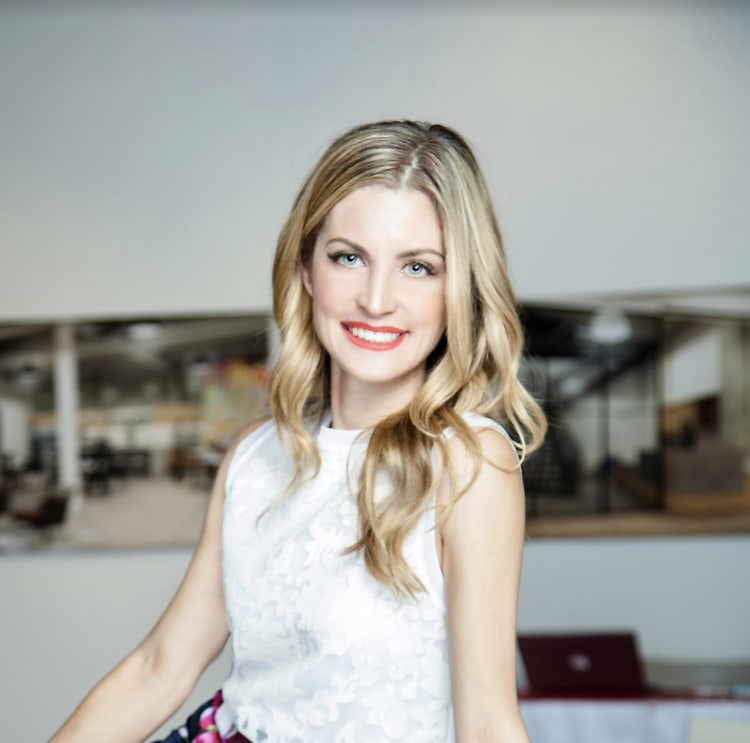Elise Tresley: CEO/Co-Founder of Realm Foods

Elise Tresley: CEO and Co-Founder of everyone's favorite no prep smoothie, Realm Foods
Prior to Realm where were you?
Before my co-founder, Lauren, and I started working on Realm, I was in the process of selling my last startup. I co-founded a tech company alongside two very talented data scientists. We grew the company to thousands of users and worked with clients like Refinery29, Buzzfeed, and Yext before selling the business in 2018. Prior to startups, I worked in finance—first at an investment bank and then a hedge fund covering the consumer sector.
What was 20 year old Elise doing that today's Elise is proud of?
When I was 20 years old, I was a junior at the University of Iowa and had just interned at Target Corporate in Minneapolis. I got an offer to work there full-time—and although I had a great experience, I was hellbent on moving to New York after college. Most of my friends and fellow interns were planning to move to cities nearby and very few seemed to understand why I’d want to move halfway across the country with zero dollars in the bank and all of my family in the midwest (“You know New York City is expensive, right?”, “Why would a kid from Iowa want to move to the east coast?”, “You’ll be back in a year.”). That was when I stopped doing two things: comparing myself to others and caring what other people think. I didn’t know much when I was 20, but I did know that the status quo wasn’t for me. And, so, I moved to NYC… which turned out to be one of the best decisions I’ve ever made.
Did you always want to work in the Health/Nutrition field?
I’ve always been fascinated by nutrition and gut health. In college, I started reading about how the food we eat impacts the way we think and feel (90% of our serotonin comes from our gut!). I completely changed my eating habits and saw such a massive difference in how I felt (it cleared up my sluggishness and even seemed to help lower my anxiety). I wanted other people to feel better, too. In fact, the first startup idea that I ever had was a 1:1 dietitian app called Welldaptive. I bought the domain and put a pitch deck together, but ended up not pursuing it. Years later, I read the book The Mind-Gut Connection—and that’s when it really clicked. The foundation of our food system had evolved into one built on preservatives, added sugar, and junk. This was around the same time that Lauren and I started talking about Realm. Fast forward a few years and now we’re building a company that’s on a mission to make healthy as easy and delicious as unhealthy.
What obstacles have you faced in your industry/career as a woman if any?
Although I was the only woman on my team (and in most rooms) during my time in finance, I was pretty naive early in my career. The challenges we face as women crept up on me slowly. It was usually subtle implications of my perceived incompetence like a side comment about what I was wearing instead of a question about what I was thinking. These challenges started to become more obvious to me as I became more senior. I once had a male boss tell me, “Elise, when you have kids, you’ll probably quit this job and turn into a nagging housewife who drinks gin and tonic everyday.” To which I said, “I’m not married and I prefer vodka,” because at 25-years old, I didn’t know what else to say except make a joke of it. Many of my female friends (in fact, most of them) have stories like this one, or worse, more blatant accounts of sexism and harassment. Today, I’m starting to understand the deeper roots of it all—larger structural challenges we face as women (e.g. childcare, equal pay, etc.) that are daily hurdles quietly holding us back. There’s an underlying bias that can be summed up in two words: marginalized and underestimated.
How do you hope to help make a more equitable path for fellow female entrepreneurs?
To say we’re overdue for a major shift in the societal expectations of women is an understatement. I think a lot about it with respect to how we’re building the culture at Realm and how we can break down gender stereotypes as the company grows. Adam Grant recently highlighted a study on gender inequality: “after companies promote female leaders, women are more likely to be seen as competent—and no less likely to be seen as caring. You can’t empower women if you don’t give them power.” We have an opportunity in the startup world to rethink how we hire, promote, and empower women. Not only women, but more specifically women of color, LBGTQIA+, and other marginalized groups. We can’t just say we’re going to build companies that are inclusive, it has to be inherent in our DNA and met with action. That’s something that we’re really focused on over here at Realm.
[Photo courtesy of @elisetresley]


.jpg)
.jpg)



.jpg)
.jpg)
.jpg)




